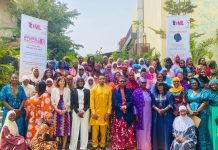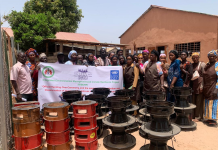With Sarjo Camara Singateh
Women from the rural setting are renewing their call for the availability of storage facilities and farming implements to help  strengthen their hard labour. This according to them will help place their basic livelihood and living condition on a formidable pillar.
These women have expressed issues of commonalities, with divergent expressions of some economic hardship that confronts them.
Mrs. Jama Jeng, a native of Kerr Sait in Upper Saloum, Central River Region-North, said she is a farmer who concentrates on gardening but the problem they are facing in their community is lack of storage facilities. She pointed out that without storage facilities all their efforts will go down the drain.
Commenting on the open defecation that has recently been banned, she welcomed the development, citing that the problem of diarrhoea with children is now history. She said everybody in their village now is sensitised on the importance of having latrines in their homes.
Mrs. Jeng was asked about how Female Genital Mutilation (FGM) is being perceived in her community, she responded that sensitisation is going on in the area but that she is coming from a non practicing community.
Another Interviewee, Teneng Bandeh from Sare-Luba in Central River Region-North, described girl’s education as key in promoting women’s right and their empowerment. She said if the girl child is educated, she will be able manage her household and also contribute to the education of her own children or adopted children.
She stated “today the reason I am suffering in the farm is because i did not go to school if I was educated this would not have been my destiny. This is why I am doing everything to support my girl child to learn.”
On FGM, she said she is a circumciser who inherited the trade from her grandmother. She explained that she has received trainings on the effects of female genital mutilation, but what she have agreed with the group that trained her to provide her with a grant that she can use to assist myself financially because she earn my living from this deep rooted traditional practice.
Madam Bandeh said the group is ready to support her and she is ready to put her knife down. “I myself during the training I came to realized that the complications that women have during child birth is due to FGM for me I think women should stop the practice,” she stressed.
She stated that cutting is not the only job she does. She said she is engaged in TBA (Traditional Birth Attendance) and also initiate women during their traditional wedding. “With all this incentives if research has shown that FGM is harmful and it is against the human rights of women we should make an end to it,” she noted.
On agriculture, she noted that women are fully engaged in it but the difficulty they are facing is farming inputs and storage facilities.
Hawa Balden of Sare Yoro Tako in Central River Region-North also made similar remarks. She said she goes to the rice fields to earn her living and sustain her family. She also stressed the need for the availability of a machine to help plough and tilt the grass. She stated that their men farm coos and maize.
She is also in support of girls’ education, noting that if the girl child is educated, she will be able to support herself. For her, she said in their community, they have stopped practicing female genital mutilation
]]>
strengthen their hard labour. This according to them will help place their basic livelihood and living condition on a formidable pillar.
These women have expressed issues of commonalities, with divergent expressions of some economic hardship that confronts them.
Mrs. Jama Jeng, a native of Kerr Sait in Upper Saloum, Central River Region-North, said she is a farmer who concentrates on gardening but the problem they are facing in their community is lack of storage facilities. She pointed out that without storage facilities all their efforts will go down the drain.
Commenting on the open defecation that has recently been banned, she welcomed the development, citing that the problem of diarrhoea with children is now history. She said everybody in their village now is sensitised on the importance of having latrines in their homes.
Mrs. Jeng was asked about how Female Genital Mutilation (FGM) is being perceived in her community, she responded that sensitisation is going on in the area but that she is coming from a non practicing community.
Another Interviewee, Teneng Bandeh from Sare-Luba in Central River Region-North, described girl’s education as key in promoting women’s right and their empowerment. She said if the girl child is educated, she will be able manage her household and also contribute to the education of her own children or adopted children.
She stated “today the reason I am suffering in the farm is because i did not go to school if I was educated this would not have been my destiny. This is why I am doing everything to support my girl child to learn.”
On FGM, she said she is a circumciser who inherited the trade from her grandmother. She explained that she has received trainings on the effects of female genital mutilation, but what she have agreed with the group that trained her to provide her with a grant that she can use to assist myself financially because she earn my living from this deep rooted traditional practice.
Madam Bandeh said the group is ready to support her and she is ready to put her knife down. “I myself during the training I came to realized that the complications that women have during child birth is due to FGM for me I think women should stop the practice,” she stressed.
She stated that cutting is not the only job she does. She said she is engaged in TBA (Traditional Birth Attendance) and also initiate women during their traditional wedding. “With all this incentives if research has shown that FGM is harmful and it is against the human rights of women we should make an end to it,” she noted.
On agriculture, she noted that women are fully engaged in it but the difficulty they are facing is farming inputs and storage facilities.
Hawa Balden of Sare Yoro Tako in Central River Region-North also made similar remarks. She said she goes to the rice fields to earn her living and sustain her family. She also stressed the need for the availability of a machine to help plough and tilt the grass. She stated that their men farm coos and maize.
She is also in support of girls’ education, noting that if the girl child is educated, she will be able to support herself. For her, she said in their community, they have stopped practicing female genital mutilation
]]>




















